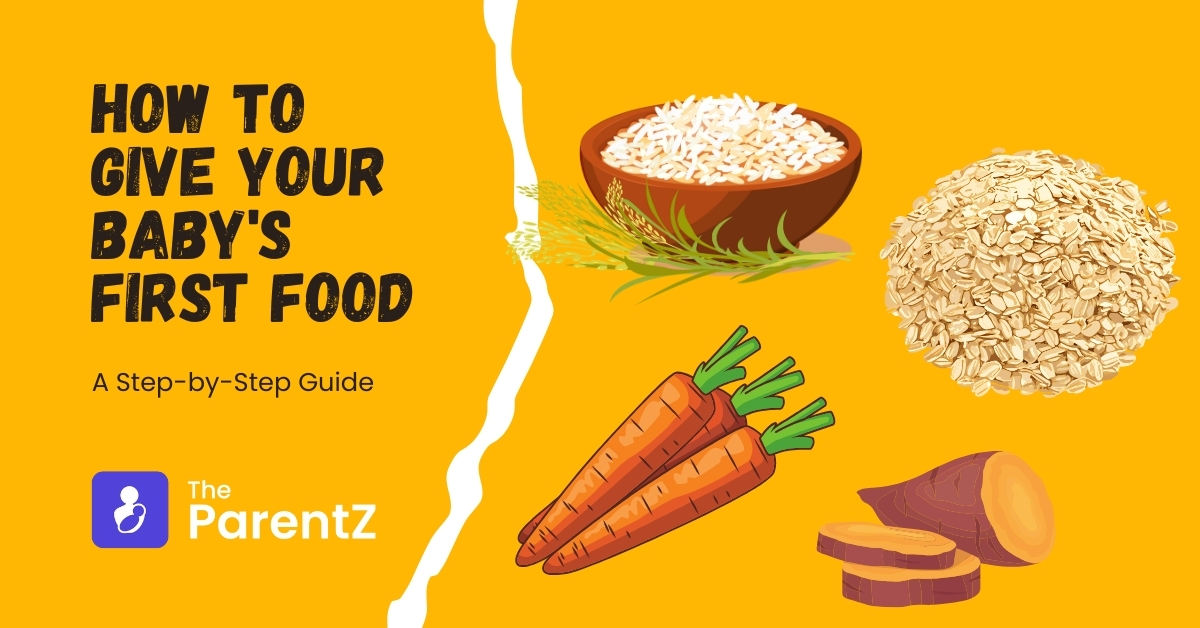Introduction
Giving your baby first solid foods is a great step, but it can also be hard to figure out and cause worry for many moms and dads. How can you tell if your baby is prepared for solid food? Which foods should you start with? How much and how often should you give food to your baby? How can you be sure your baby gets everything they need to grow and develop well?
In this article, we will answer these questions and more, and provide you with some practical tips and resources to help you introduce your baby’s first food safely and enjoyably.
When to start solids
The World Health Organization (WHO) and the American Academy of Pediatrics (AAP) recommend introducing babies to their first foods at some point between four to six months, taking into consideration their readiness for solid food.
These signs include:
- Sitting upright with minimal support interested in food and getting to it.
- Accepting their meal when given to them.
- Stopping the tongue push habit that helps get food out of their mouth. Ability to eat food without feeling like throwing up.
You should not start giving your baby food before four months old, as their tummy and immune system are still growing and aren’t ready for it yet. At 6 months, don’t wait to start giving your baby solid foods. As the need for nutrients grows and breastmilk or formula may not be enough, it is important you begin this process on time.
What foods to start with
There’s no special food to give a baby first. You can choose any food that is soft, smooth, and easy to swallow, such as:
- Mixed baby food (rice, oats, or barley) with milk from mom’s breast or formula. Fruits (like bananas, apples, and pears) when they are all mixed together.
- Mashed vegetables (carrots, sweet potatoes, pumpkins, and so on) are made just by blending or puréeing.
- Mashed-up chicken, beef and lamb meat.
You can give your baby small foods like soft bread, cheese, pasta, and cooked veggies to help them learn how to chew things by themselves. This helps them practice getting food all on their own too!
You need to stay away from foods that can stick in your throat, such as whole nuts, grapes, and popcorn. Also, leave out hard candies too. You need to steer clear of foods that can lead to allergies like honey. They include cow’s milk and shellfish until your baby is over 1 year old. You can start with one new food at a time and then wait for 3 to 5 days before adding another.
This way you can watch for any signs of allergies or stomach problems that may be caused by the food you’re introducing.
Some common signs of food allergy include
- Rash, hives, or swelling
- Vomiting, diarrhea, or abdominal pain
- Wheezing, coughing, or difficulty breathing
- Loss of consciousness or shock
If you see these signs, stop giving your baby this food right away and call the doctor.
How much and how often to feed your baby
You can begin by giving your baby two to three spoonful of food twice a day. As the child becomes more familiar with eating solid foods, you can slowly add more quantity and do it even more often. You can also pay attention to your baby’s signs they are hungry or full, letting them choose how much food they want. Don’t make them eat more than they want or try foods that don’t like.
You need to keep giving your baby breast milk or formula as normal. This is important until the baby turns 1 year old because these things should still be what they mainly eat from then onwards. Solids are a special kind of food that gives your baby more energy and good stuff for growing strong.
You can give baby food before or after breast milk or formula, depending on what your baby likes best. You can give your baby water in a cup or bottle but don’t offer juices, sodas, or sweet drinks because they cause bad teeth and extra weight.
Tips and resources for feeding your baby
Here are some tips and resources to help you feed your baby solids safely and enjoyably:
- Make eating a happy and fun time for your baby.
- Let them discover different tastes and textures, and compliment them for trying new food.
- Don’t get mad if they push away or don’t like some foods. They may need many times to say yes to them finally. Keep trying!
- Use a small chair, spoon, and cloth to feed your baby.
- Don’t give food to your baby while in a car seat, stroller, or crib because these things might make them choke.
- Don’t give your baby food from a jar, as it might have bad bacteria and spoil the meal. Make baby food from scratch, buy soft ready-made food for your child’s age, or use foods meant for the right stage of development.
- Look at the labels to find out what ingredients they have, when they expire, and nutritional information.
- Don’t put salt, sugar, or spices in your baby’s food because they can hurt them and make it taste bad.
- Keep and heat your baby food safely.
- Keep any unused food in tight containers in the fridge or freezer. Use it up within 2 to 3 days.
- Cook the food until it’s warm and mix it well to stop areas that can burn. Throw away any leftover food after feeding the baby, and don’t use it again.
Conclusion
Starting to feed your baby food for the first time is a big and fun part of their journey. By using the advice in this article, you can make sure your baby has a great start to their health and joy. Keep in mind that each baby is different and you understand your child the best, so never doubt to adjust how much food or milk they get based on what works well for them. Happy feeding!








Be the first one to comment on this story.